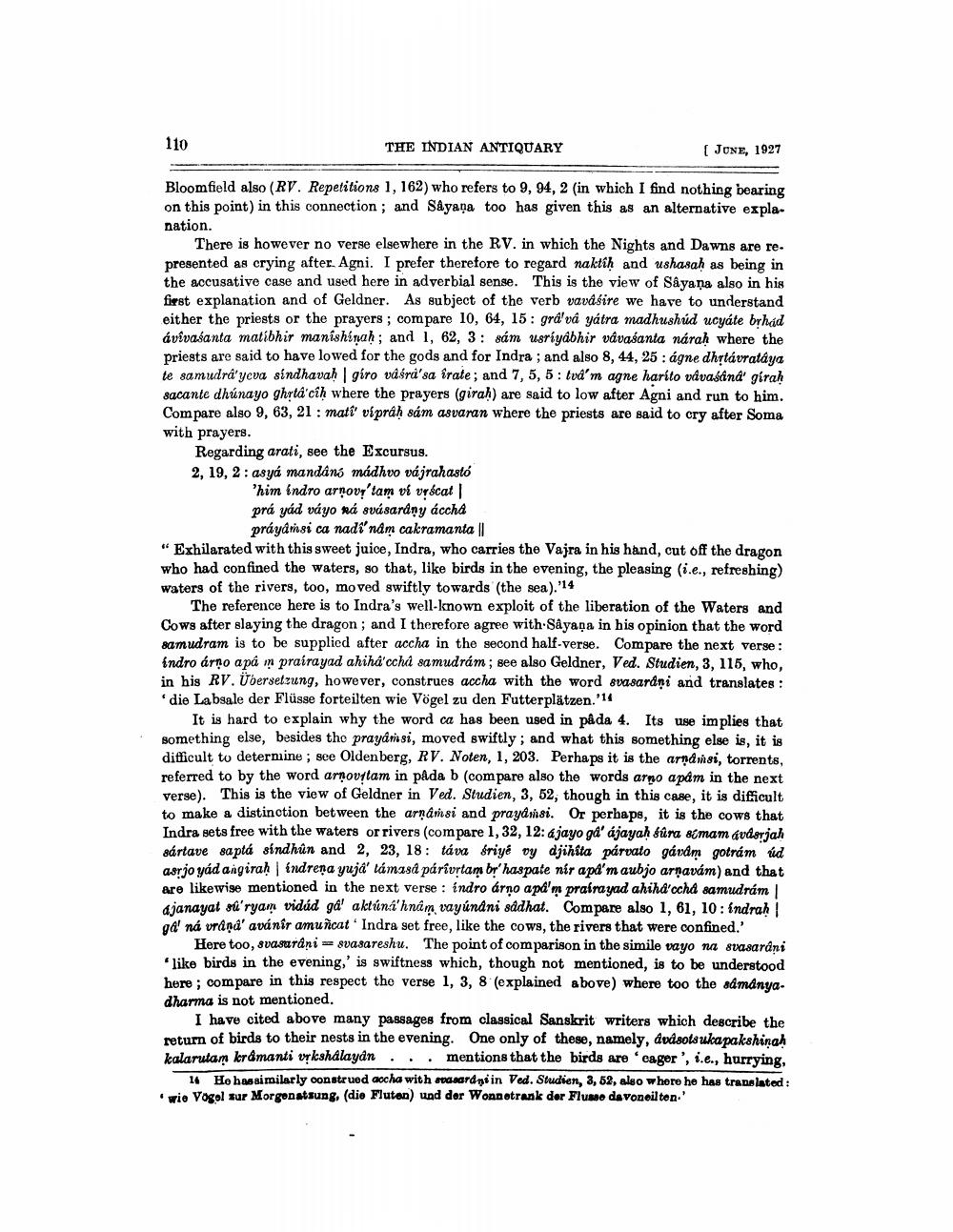________________
110
THE INDIAN ANTIQUARY
( June, 1927
Bloomfield also (RV. Repetitions 1, 162) who refers to 9, 94, 2 (in which I find nothing bearing on this point) in this connection; and Sayana too has given this as an alternative explanation.
There is however no verse elsewhere in the RV. in which the Nights and Dawns are re. presented as crying after. Agni. I prefer therefore to regard naktih and ushasah as being in the accusative case and used here in adverbial sense. This is the view of Sayaņa also in his first explanation and of Geldner. As subject of the verb vavdfire we have to understand either the priests or the prayers ; compare 10, 64, 15 : gra'va yatra madhushúd ucyáte brhad ávivasanta matibhir manishirah; and 1, 62, 3: sám usriyabhir vavasanta nárah where the priests are said to have lowed for the gods and for Indra ; and also 8, 44, 25 : ágne dhrtávrataya te samudra'yova sindhavah | giro vásra' sa frate; and 7, 5, 5 : tvá'm agne harito vivasánd' girah sacante dhúnayo ghrtá cîh where the prayers (girah) are said to low after Agni and run to him. Compare also 9, 63, 21 : mati' vipráh sám asvaran where the priests are said to cry after Soma with prayers.
Regarding arati, see the Excurgus. 2, 19, 2: asyá mandano madhuo vájrahasto
'him indro arnour' tam vi vrscat prá yád váyo ná svúsardny áccha
práyarisi ca nadi' nam cakramanta " Exhilarated with this sweet juice, Indra, who carries the Vajra in his hand, cut off the dragon who had confined the waters, so that, like birds in the evening, the pleasing (i.e., refreshing) waters of the rivers, too, moved swiftly towards (the sea).'14
The reference here is to Indra's well-known exploit of the liberation of the Waters and Cows after slaying the dragon; and I therefore agree with Sayaņa in his opinion that the word samudram is to be supplied after accha in the second half-verse. Compare the next verse : indro árno apám prairayad ahihá'cchd samudrám; see also Geldner, Ved. Studien, 3, 115, who, in his RV. Übersetzung, however, construes accha with the word svasarani and translates : die Labsale der Flüsse forteilten wie Vögel zu den Futterplätzen.'11
It is hard to explain why the word ca has been used in pada 4. Its use implies that something else, besides the prayâmsi, moved swiftly; and what this something else is, it is difficult to determine ; see Oldenberg, RV. Noten, 1, 203. Perhaps it is the arnámsi, torrents, referred to by the word arnovytam in pada b (compare also the words arno apám in the next verse). This is the view of Geldner in Ved. Studien, 3, 62, though in this case, it is difficult to make a distinction between the arnámsi and praydusi. Or perhaps, it is the cows that Indra sets free with the waters or rivers (compare 1, 32, 12: ajayo gd' ájayah fûra símam avdarjah sártave saptá sindhûn and 2, 23, 18: táva sriyé dy djihita párvato gávdm gotrám vid asrjo yád angirah | indrena yujá' támasd párívrtam by' haspate nir apd'm aubjo arnavám) and that are likewise mentioned in the next verse : indro árņo apá'm pralrayad ahihå'cchd samudrám! ajanayat si'ryan vidád går aktúni'hnam vayúnáni sádhat. Compare also 1, 61, 10: Indrah! gal ná vrána' avánir amuncat. Indra set free, like the cows, the rivers that were confined.'
Here too, svasarani = svasareshu. The point of comparison in the simile vayo na svasardni like birds in the evening,' is swiftness which, though not mentioned, is to be understood here, compare in this respect the verse 1, 3, 8 (explained above) where too the sámányadharma is not mentioned.
I have cited above many passages from classical Sanskrit writers which describe the return of birds to their nests in the evening. One only of these, namely, dvdsots ukapakshinah kalarutan kråmanti urkshalayan... mentions that the birds are cager', i.e., hurrying,
24 Ho hassimilarly construed aocha with pasardni in Ved. Studien, 3, 52, also where he has translated i Vogol zur Morgenstsung, (dio Fluten) und der Wonnotrank der Flumo devoneilten.'




